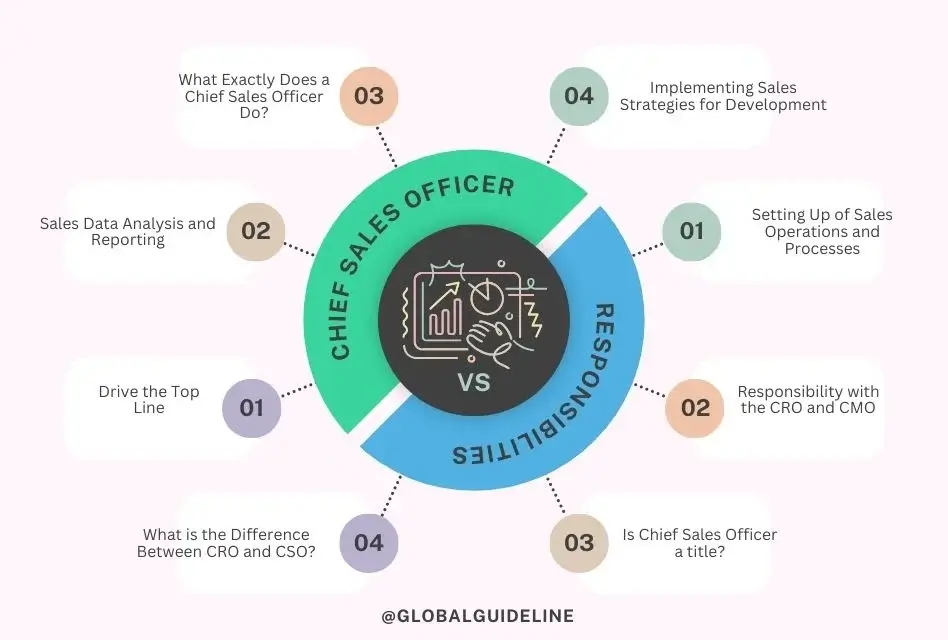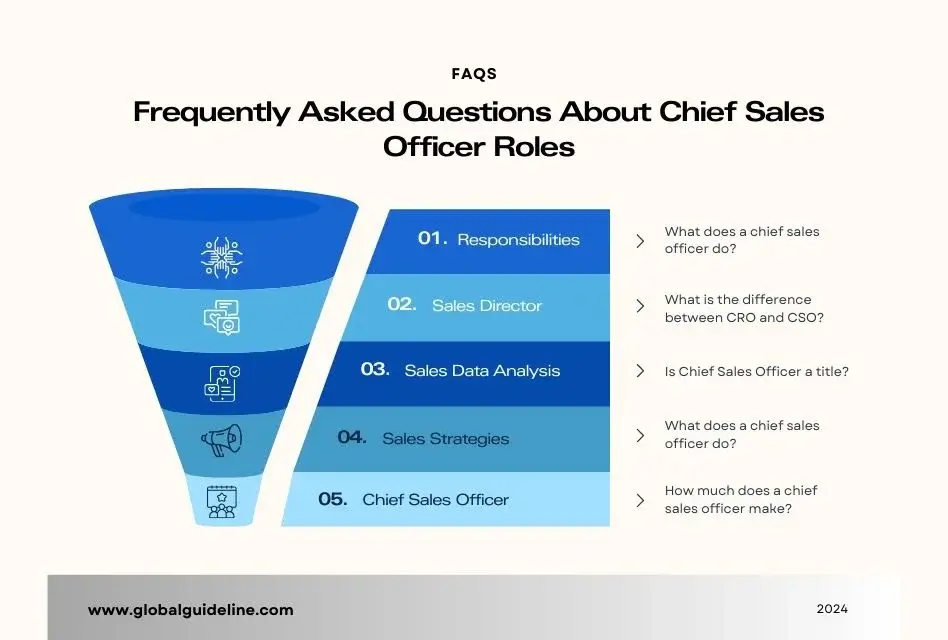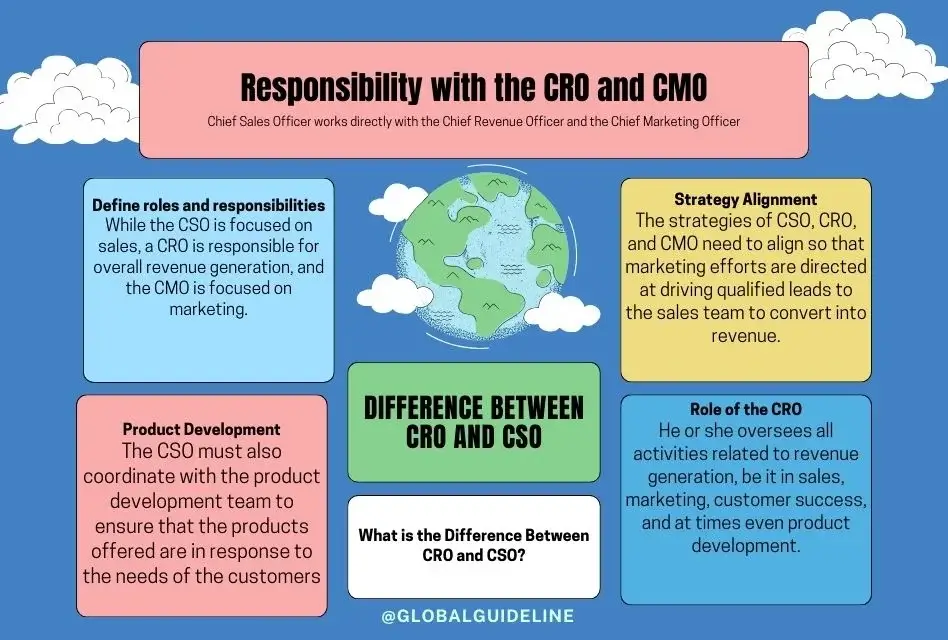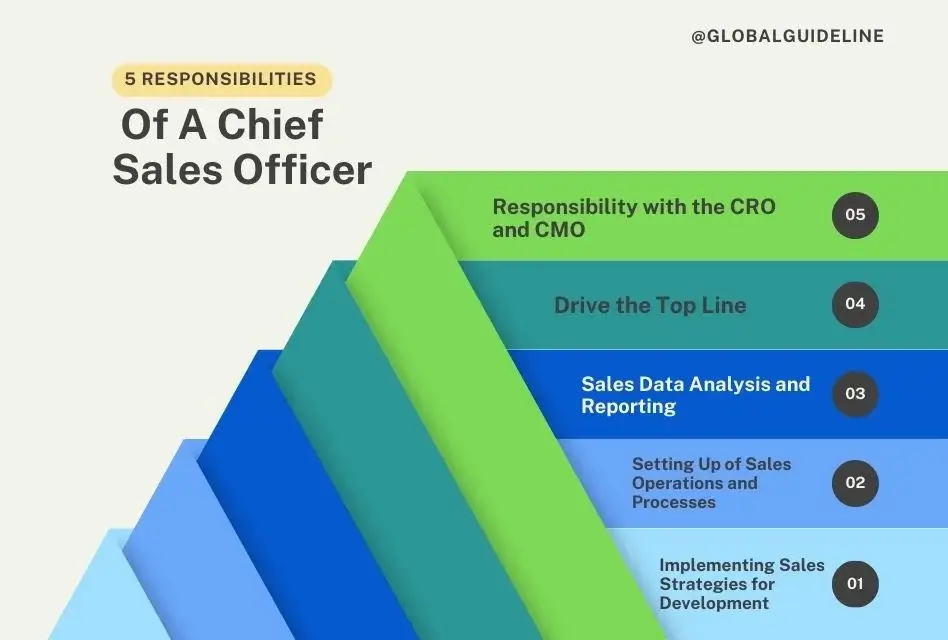Thereof, the role of the CSO becomes really important in growing and securing the success of a company, more so of highly competitive market the USA. In respect to this fact, the CSO becomes that very executive who oversees all the activities related to sales within the firm, which makes him much instrumental in shaping the sales strategy, achieving revenue targets, and ensuring the overall effectiveness of the sales team. This article will explore the top 5 responsibilities that face a Chief Sales Officer residing within the United States of America, discoveries associated with this role, and some in-depth tips for improving the skills and qualities needed to succeed when functioning at such an advanced level.
Table of Contents

What Exactly Does a Chief Sales Officer Do?
The CSO is the senior executive in charge of the overall sales department and drives the sales strategies of the company. The job of the CSO is different from another sales job by dealing with strategies that are on a very high level, generally focusing on the long-term growth and sustainability of the company. In this regard, it would form proper lines of sight between the sales strategies and overall business goals, instilling a properly working sales team that will help drive the revenue growth of the company.
1. Implementing Sales Strategies for Development
An important responsibility of the Chief Sales Officer is to direct and implement sales strategies within the framework of the company’s overall strategic intent. He has to:
- Study the Market Trends: Sound knowledge about the existing market trends, the customers’ needs, and the competitive scenario guides the CSO to formulate strategies to take full advantage of the available opportunities and to avoid possible threats.
- Setting Some Targets: It’s the responsibility of a CSO to set ambitious, realistic, and soundly achievable sales goals that are commensurate with the revenue targets set for a company. They should be clear, measurable, and aligned with the company’s long-term objectives.
- Coordinating with Other Departments: The CSO will assure effectiveness in sales strategies by working closely with other departments, such as marketing, product development, and customer service. This is helpful in ensuring that selling efforts have intensive underpinnings of marketing campaigns, quality products, and high customer services.
Key Takeaway: The CSO should develop an execute effective sales strategies in relation to corporate objectives and adequately supported by proper market insights.
2. Setting Up of Sales Operations and Processes
This is yet another high-profile responsibility of a CSO: to oversee the sales operations and processes. Some major areas of interest include:
- Sales Effectiveness: He has to take care of the efficiency and effectiveness of the sales process, including analysis of sales data to find areas of improvement, optimization of sales workflows, and best practices in place.
- Team Management: A CSO will lead the sales team by recruiting, training, and managing sales executives. He or she should inspire the team to perform better, train them properly, and align with the sales goals set for the company.
- Sales Technologies: The CSO also needs to take charge of the implementation of sales technologies. In this information age, such devices are quite necessary for the administration of customer relationships, tracking of sales activities, and sales data analysis.
Key Takeaway: The CSO must ensure that sales operations are effective and productive. This includes managing the sales team, optimizing sales processes, and leveraging sales technologies in driving sales effectiveness.
3. Sales Data Analysis and Reporting
A huge part of the Chief Sales Officer’s job is to look through sales data analysis and report back to the executive team. This includes:
- Sales Performance Analysis: The CSO shall, from time to time, look through the sales performance data to see if the selling strategies in place are effective. This shall involve key metrics analysis, including revenue growth, customer acquisition, and conversion rates.
- Forecasting and Budgeting: A CSO is responsible for the forecasting of future sales and making relevant budgets. Proper forecasting would help the company to be in a position to achieve its sales with the right means or resources available.
- Reporting to the executive team: The CSO will be required to provide regular reports to the executive team regarding sales performance, challenges, and opportunities. Such reporting is key to making informed strategic decisions and ensuring that the sales efforts remain aligned with the overall objectives of the company.
Key Takeaway: CSOs are supposed to have the ability to report and analyze sales data in a high-level view, providing insight to the executive team for making decisions and ensuring that the sales effort is on track to meet goals set by the company.
4. Drive the Top Line
Driving revenue growth is, ultimately, the number one job of the Chief Sales Officer. This consists of:
- Seeing New Revenue Opportunities: The CSO is always seeing the big new revenue opportunities—going into new markets, launching new products, growing penetration in current customers, all of which demands an understanding of the market and big-picture sales strategy.
- Close Deals: At the top level, a CSO will be needed to close big deals that are very important to a company. They will have to establish good negotiation skills and the ability to establish relations with important customers.
- Long-Term Growth: He has to keep a balance between short-term goals of revenue and long-term growth. He needs to think of strategies that will ensure long-term revenue growth, not just short-term wins.
Main takeaway: The primary role of a CSO is to develop revenue growth. In this regard, the CSO has the responsibility to help in identifying a new throat to choke, closing some of the major transactions, and developing strategies that guarantee long-term growth.
5. Responsibility with the CRO and CMO
In many companies, the Chief Sales Officer works directly with the Chief Revenue Officer and the Chief Marketing Officer to ensure alignment of the sales, marketing, and revenue strategies. This includes:
- Define roles and responsibilities: While the CSO is focused on sales, a CRO is responsible for overall revenue generation, and the CMO is focused on marketing. There should be clear and precise role clarity and, at the same time, tight collaboration across these executives.
- Strategy Alignment: The strategies of CSO, CRO, and CMO need to align so that marketing efforts are directed at driving qualified leads to the sales team to convert into revenue.
- Product Development: The CSO must also coordinate with the product development team to ensure that the products offered are in response to the needs of the customers and that they are positioned correctly within the market. This will require very close coordination with the CRO and CMO to ensure that strategy, sales, marketing, and products are aligned.
Key Takeaways: Certainly, a CSO will need to cooperate with a CRO, CMO, and other key executives: only then will sales strategies be aligned with the overall revenue and marketing ones, in search of the best possible results.

What is the Difference Between CRO and CSO?
Companies building their executive staff need to understand what sets a Chief Revenue Officer apart from a Chief Sales Officer.
- Role of the CRO: He or she oversees all activities related to revenue generation, be it in sales, marketing, customer success, and at times even product development. A Chief Revenue Officer looks at the whole journey from customer acquisition to customer retention.
- CSO: The CSO is focused on sales alone. His core responsibilities will be increasing sales and aligning the sales strategies with the revenue targets set by the firm.
- Key Differences: While both roles remain focused on revenue, a CRO encompasses marketing and customer success; a CSO is focused only on sales. The former two need to work together to hit the revenue goals set by the company.
Key Takeaway: While there is a role dedicated to being a chief revenue officer (CRO) and another for a chief sales officer (CSO), the two roles are not mutually exclusive. The former oversees overall revenue, while the latter looks more toward sales in particular. Both are strategic roles geared toward the growth and success of the company.
Chief Sales Officer vs. Sales Director
One other very important differentiation can be recognized as that between a chief sales officer and a sales director.
- Role of the CSO: As mentioned above, the CSO is a senior executive who takes care of the overall sales strategy for the company and long-term growth. The vice president is involved in strategic decision-making with broad areas of responsibilities on his shoulder.
- The role of the sales director: A sales director would focus more on the day-to-day management of the sales team. They are responsible for implementing the sales strategies developed by the CSO and seeing that the sales team meets its targets.
- Key Differences: The key differences are that the CSO operates at a more strategic level, while the Sales Director is an operational management position. The CSO sets the sales strategy, and the Sales Director delivers it.
This holds the key lesson for its implication: the CSO and sales director have entirely different yet complementary roles. While the CSO keeps a strategic, long-term focus, the Sales Director takes charge of the sales team and execution of the sales strategy.
Chief Sales Officer Salary
The salary of the chief sales officer varies or differs by company size, industry, and location. The compensation for CSOs in the USA is normally high due to the responsibilities and skills required for the position.
- Chief Sales Officer Salary NYC: In New York City, the average salary of the CSO would lie between $200,000 and $400,000 annually, with the size and success of a company playing a major role in salary determination.
- Chief Sales Officer Salary UK: The salary for a CSO in the UK would be around £120,000 to £250,000, dependent on factors such as location and industry.
- Factors Influencing Salaries: The CSO’s salary will change with the size and industry of the company and with the geographical location. Besides, many CSOs are offered incentives, and revenues based on the performance-driven bonuses, and equity are a few benefits that multiply their gross compensation.
Key Takeaway: Salaries for a CSO are typically very high, seeing the level of responsibility and expertise required. The salary might vary depending on location, industry, and company size.
Chief Sales Officer Interview Preparation
In a Chief Sales Officer interview, you will come across different questions regarding the experience and skills you have towards the sales discipline and leadership approach. Some of the common questions are the following:
- What is your approach towards developing and implementing sales strategies?
- Answer: Illustrate how you would assess market trends, set targets on sales, work on collaboration with other departments and their strategies to develop, and implement an effective sale plan.
- How do you manage your sales team to be effective and motivated?
- Answer: Outline how you would manage a team, from recruiting and training to motivating sales executives. Explain your methods of using sales technologies to track performance and streamline processes.
- How do you work with the CRO and CMO to guarantee that the sales strategies align to the company’s goals for revenue?
- Answer: Explain how you prepare to align sales, marketing, and revenue strategies with the CRO and CMO. Discuss your experience in synchronizing product development with sales and marketing efforts.
Key Takeaway: How to prepare for the CSO job interview is to be able to articulate how one can think strategically, help lead, and collaborate with other members at the executive level of management.
FAQs: Frequently Asked Questions About Chief Sales Officer Roles
What does a chief sales officer do?
CSOs design and execute sales plans, manage sales operations, analyze sales data, drive increases in revenue, and work jointly with other executives to achieve related goals.
What is the difference between CRO and CSO?
While the CRO oversees all activities that generate revenue, the CSO focuses on sales only. The role of a CRO is much wider, covering marketing and customer success, while that of the CSO concentrates on sales alone.
Is Chief Sales Officer a title?
Yes, Chief Sales Officer is a title usually bestowed upon the executive responsible for managing the sales strategy of a company and heading its sales department.
What does a chief sales officer do?
The CSO designs and executes sales strategies, manages sales force, analyzes sales performance, drives revenue growth, and collaborates with other executives to ensure the sales efforts stay focused on goals for the company.
How much does a chief sales officer make?
The salary of the CSO may vary depending upon the size, industry, and location of the company. In the USA, the income of the CSOs ranges from $200,000 to $400,000 annually with more performance-based bonuses and equity.

Conclusion
The Chief Sales Officer is an essential designation or requirement of any organization to function successfully. The CSO sets the sales goals for the company, and its long-term success is derived from developing effective sales strategies, supervising sales operations, analyzing performance data, and driving revenue growth. Whether you are preparing for a CSO job or just want to learn what this high-level role offers, it goes without saying that a CSO is an important member of any executive team of companies. The CSO and other similarly strategic, influential sales leaders will only be more vital as businesses grow and reinvent themselves.










